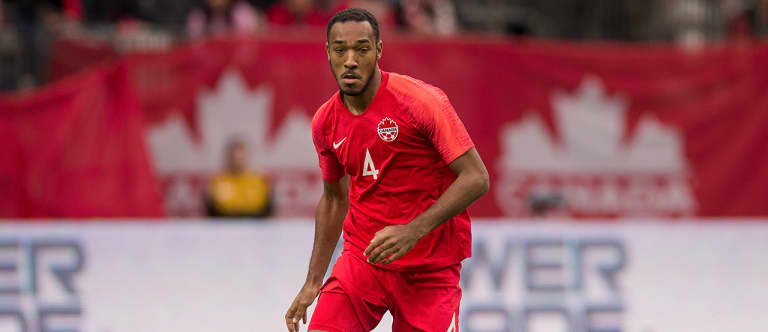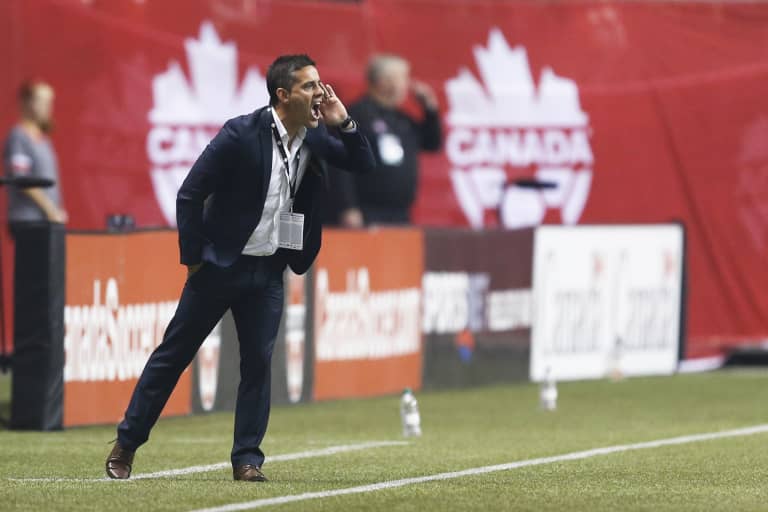For the first time in a decade, the Concacaf Gold Cup knockout stage isn’t a pie-in-the-sky dream for Canada—it’s the bare-minimum expectation.
After bundling out of the group stage in heartbreaking, last-minute fashion at the 2011 tournament, Les Rouges went winless and goalless at both the 2013 and 2015 editions. The tide seemed to be turning two years ago, with an injection of energy from a new head coach and a number of young stars-in-waiting.
Still, it was with only the most cautious of optimism that Canadian fans approached the 2017 Gold Cup, given that few knew what to expect from newly appointed head coach Octavio Zambrano. Also, fans hardly needed reminding of having been previously burned by youthful promise gone unfulfilled.
But with Zambrano’s fluid tactical approach and star-making turns from the likes of Alphonso Davies and Mark-Anthony Kaye, Canada returned to the Gold Cup knockout stage for the first time since 2009, ultimately falling just short against a Jamaican side that went all the way to the final.
Now, with John Herdman following a similar path as Zambrano, and 18-year-old Davies earning time with Bayern Munich (having moved from the Vancouver Whitecaps in the biggest transfer deal in league history), there’s virtually no fear of regression to the doldrums in which Canada found themselves during much of the decade.
In fact, since the last Gold Cup, the outlook for the men’s national team has brightened with a speed and intensity few could have foreseen. To wit: the following is a non-exhaustive list of players who’ve solidified their spots in Herdman’s system in just the last 24 months.
There’s Jonathan David, a 19-year-old striker playing with Gent in Belgium’s top league, who’s notched four goals in his first four Canada appearances. Then there’s Liam Millar, a 19-year-old Liverpool property who was man of the match in his Canada debut, thanks to his dynamic play on the wing.
Closer to home, there’s the defensive duo of 21-year-old Derek Cornelius (Vancouver Whitecaps) and 20-year-old Zachary Brault-Guillard (Montreal Impact), both of whom are presumptive Gold Cup starters.

Cornelius has emerged as a solid defensive option for Canada | Courtesy of Canada Soccer
And there are some surprises in Herdman’s 23-man squad as well: Neither 21-year-old Kamal Miller (Orlando City SC) nor 18-year-old Noble Okello (Toronto FC) have played a minute for Canada’s full senior side as of yet. But, as has been said before, Herdman—in his time as gaffer of Canada’s women’s national team and, now, the men’s national team—has proven adroit at identifying young talents who can step onto the stage and shine at the right moments.
It’s not just about the youth, however. This tournament is presumably the swan song for 36-year-old stalwart Atiba Hutchinson; though, in fairness, that’s the same thing we were thinking two and a half years ago.
Will Johnson of Orlando City, who debuted with Canada in 2005, is also back on board, while the duo of Junior Hoilett (Cardiff City) and Scott Arfield (Rangers)—despite being relative newcomers to the national-team scene—are among the most dangerous midfielders in Concacaf.
In stark contrast to the team’s nadir in 2013 (a year that featured 13 games, only one goal scored, and seemingly a minimum of five centerbacks on the field at all times) the Canadian side of 2019 is overloaded with attacking options, to the point where the likes of Ballou Tabla and Tesho Akindele are on the outside looking in.

CanMNT head coach John Herdman. | USA Today Images
This isn’t, by anyone’s estimation, a team that will be hanging on for dear life, either by choice or out of necessity. This is a team from which fans will be expecting (reasonably or not) a minimum of two wins in the group stage, over Martinique (June 15) and Cuba (June 23), and a competitive showdown against the regional juggernauts from Mexico (June 19).
Never mind that Martinique equaled Canada’s record in recent Concacaf Nations League qualifying (with four wins from four games), or that the non-FIFA side actually defeated Canada at the 2013 Gold Cup (in the same venue where they’ll meet this year, the Rose Bowl).
And never mind that, on top of Mexico’s obvious skill and experience, that game will be played at elevation in Denver, bringing additional comfort to members of El Tri accustomed to the altitude at Estadio Azteca.
And perish the thought that despite the incredible skill and promise they’ve so far shown for club and country, this will be the first condensed, competitive tournament in which this new Canadian core has actually played together.
Based on what we’ve seen (six wins in seven games since the last Gold Cup) and what we think we’ll soon see, there’s nearly nothing that can drag this team down from its present psychological perch, heading into the 2019 Gold Cup.
Except, perhaps, the loathsome burden of high expectations.












